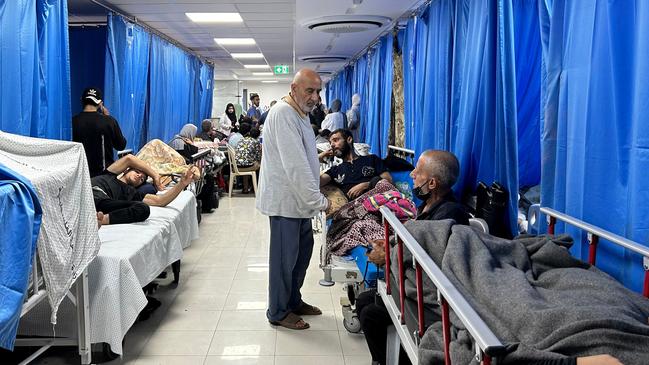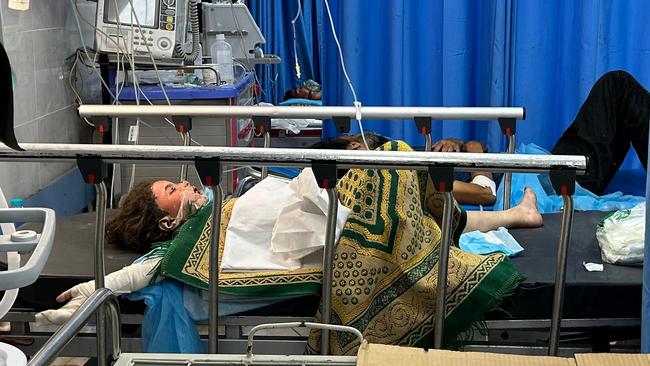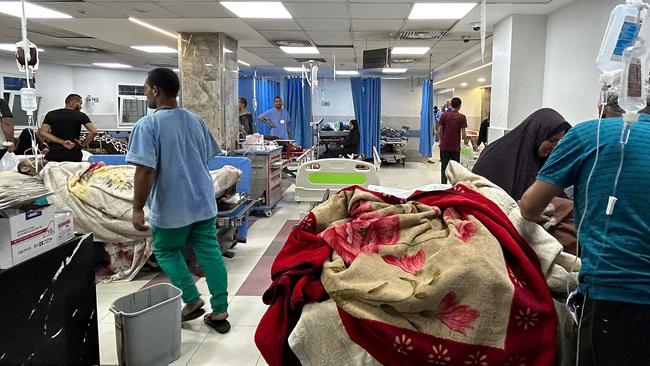Nowhere to hide at ‘catastrophic’ al-Shifa Hospital in Gaza City
Palestinians seeking refuge at Gaza’s largest hospital and staff said they were trapped in increasingly horrific conditions as heavy fighting raged nearby.

Palestinians seeking refuge at Gaza’s largest hospital and staff said they were trapped in increasingly horrific conditions, with two premature infants dying due to lack of electricity as heavy fighting raged nearby overnight on Saturday.
The gunbattles and intense bombardment around the al-Shifa hospital came as Israel pressed deep into Gaza City in its offensive aimed at destroying the militant group Hamas in the territory it rules.
“Shooting is never stopping, airstrikes are unabated as well as artillery shells,” said a witness who spoke on condition of anonymity. “There are dozens of bodies around the complex that nobody can reach.”
Though tens of thousands of people have fled the fighting, many have taken shelter in northern Gaza’s hospitals, which have been repeatedly hit by explosive strikes and gunfire.
“The hospital is besieged, with no option to bring in the corpses and injured people sprawled outside. There is no movement in or out of the hospital,” said Physicians for Human Rights Israel, citing doctors at al-Shifa.

The Israeli doctors’ group said that due to an overnight blackout, the neonatal intensive care unit had stopped working and two premature infants had died, and left the lives of 37 other infants at risk.
“The situation in al-Shifa is truly catastrophic,” said Ann Taylor, head of the Palestinian Territories mission for the medical charity Doctors Without Borders.
The Israeli military has denied strikes or a siege at al-Shifa hospital, and has repeatedly accused Hamas of using medical centres as command centres and hideouts – a charge the group denies.
The Israeli army also said it would “provide the assistance needed” to help “babies in the paediatric department to get to a safer hospital”.
Hamas fighters poured through the militarised border with Israel on October 7, killing around 1200 people, mostly civilians, and taking about 240 people hostage, according to the most recent Israeli figures. Israel’s campaign has killed more than 11,000 people, also mostly civilians and thousands of them children, according to the latest figures from the health ministry in Hamas-run Gaza.
Hezbollah chief Hassan Nasrallah on Saturday said the group had “bolstered” its action “on the Lebanese front in terms of the number of operations, targets and the type of weapons”.
Nasrallah’s speech prompted a warning from Israeli Defence Minister Yoav Gallant, who said Lebanese citizens would “pay the price” and added: “What we’re doing in Gaza, we can also do in Beirut.”
Speaking at a summit of Arab and Muslim leaders in the Saudi capital Riyadh, Iranian President Ebrahim Raisi called on Islamic governments to designate Israel’s military a “terrorist organisation”.
Iran backs Hamas as well as Lebanon’s Hezbollah and Yemen’s Huthi rebels, placing it at the centre of concerns the war could expand.

A final statement from the summit rejected Israeli claims that it is acting in “self-defence” and demanded that the UN Security Council adopt “a decisive and binding resolution” to halt Israel’s “aggression”.
Prime Minister Benjamin Netanyahu has indicated that Israel does not want to occupy Gaza again, as it did between 1967 and 2005, but would have “security control” of Gaza when the war ended.
Mr Netanyahu on Saturday ruled out a role for the Palestinian Authority (PA) leadership in Gaza after the war.
“There will have to be something else there,” he said of the PA, which was driven out of Gaza by Hamas in 2007 and has partial administrative control in the occupied West Bank.
US Secretary of State Antony Blinken said late last month that the PA should retake control of the Gaza Strip from Hamas, with international players potentially filling a role in the interim.
In addition to the clashes around Al-Shifa, the situation was fraught at other hospitals in northern Gaza at the weekend, where Palestinians have sought refuge from intense gunbattles and bombardment.
The Palestinian Red Crescent Society said fighting around the al-Quds hospital had created a “state of panic and extreme fear” among the displaced people sheltering there.
AFP



To join the conversation, please log in. Don't have an account? Register
Join the conversation, you are commenting as Logout